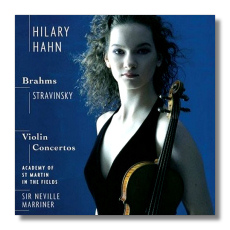
The Internet's Premier Classical Music Source
Related Links
-
Brahms Reviews
Stravinsky Reviews - Latest Reviews
- More Reviews
-
By Composer
-
Collections
DVD & Blu-ray
Books
Concert Reviews
Articles/Interviews
Software
Audio
Search Amazon
Recommended Links
Site News
 CD Review
CD Review
Brahms / Stravinsky

Violin Concertos
- Johannes Brahms: Concerto for Violin in D Major, Op. 77 (1879)
- Igor Stravinsky: Concerto for Violin in D Major (1931)
Hilary Hahn, violin
Academy of St. Martin-in-the-Fields/Neville Marriner
Sony SK89649
Also released on Multichannel SACD
Amazon
- UK
- Germany
- Canada
- France
- Japan
- ArkivMusic
- CD Universe
Stravinsky's Violin Concerto waited seventy years for this performance. The work has been more successful as accompaniment to a Balanchine ballet than as a concert piece and Hahn hopes to see it better established in the standard repertoire. She is likely to help that along. Having first came to it in the course of score-reading when she found herself musically on her own at age 17, after the death of her teacher, Brodsky, and, much taken with its "combination of jaunty brilliance and pensive lyricism…quirky rhythms [and] many references to Bach," she played it with seven orchestras prior to this recording, years later. That being the case, I am inclined to think that Hahn's views of this work are dominant in the performance, as Stravinsky's own view of the matter is dominant in the recording he did with Isaac Stern. The present performance is quite different from that, in exciting ways.
One particularly interesting thing about this performance is that, as she implies in her notes, she plays the opening Toccata much faster than any recorded performance and closer to the tempo indicated in the score than Stravinsky does in his own recorded performance with Stern. Hahn/Marriner do it in 4:51 and Stern/Stravinsky take 5:35. The effect is that Hahn's performance scampers and swaggers, while Stravinsky's, although it does strut, has more of a metronomic, plodding pace to it that reminds me of nothing so much of the way Klemperer took the Scherzo in Beethoven's Ninth Symphony. Interesting, even canonic, in Stravinsky's case, but somehow not ideal. I say this in spite of the fact that I mostly forego the search for ideal performances in favor of appreciating what is good and distinctive about real ones.
The middle movements, Arias 1 and 2, are more spiky in the Stern/Stravinsky and more lyrical, even soaring, with gentle strength, in Hahn/Marriner. The second Aria is nearly a full minute longer in the latter. (6:07 compared with 5:10.) The other two movements are of equivalent length in the two performances, but the approach and effect is different: Hahn's Capriccio is lively and youthful; Stravinsky's is more sassy, but at the end of the movement, as at the beginning of the concerto, Stravinsky's tempo makes the rhythm sound four-square. Marriner's rhythms toward the end are slashing, reminiscent perhaps of the younger Stravinsky.
For a long time I accepted the notion that there is a chasm between early Stravinsky and the neo-classical Stravinsky. Actually, his characteristic approach to rhythm and harmony are remarkably comparable throughout his career. Some of the differences are a matter of smaller forces he used after his first period. I wonder how much also is a matter of the advanced age at which he recorded his works in later years and whether this slowed him down.
Smaller forces are one notable facet of the Brahms recording here. To my ears, they are sufficient, even refreshing (and bravo to the woodwinds in the slow movement.) In contrast, the larger forces of, say, the Chicago Symphony in the Pearlman/Giulini recording, add power in the tuttis and a greater weightiness to the effect generally, but I am not sure that is really needed in this work. At any rate, I find that I like this performance quite a lot more than I expected to, given the reservations I have often had about Marriner and given the restrained nature of Hahn's performance in the Barber Concerto (noted in my review of Sony 89029). Aside from that, there is little I feel a need to say about this very pleasurable performance of the Brahms. It is beautiful, and I expect to return to it often.
I have high regard for Hahn's musicianship. Aside from her exceptional technical ability, what she says about her self-directed exploration of scores alone suggests that she is unlikely to burn out and likely to develop a wide repertoire. Some of that repertoire is likely to be totally new, judging by Sony's commissioning of Edgar Meyer's delightful concerto. I would love to see further commissions, starting perhaps with concertos by Melinda Wagner, who won the Pulitzer prize a couple of years ago (Bridge 9098), Libby Larsen, Daniel Asia, and Christopher Rouse.
Copyright © 2003, R. James Tobin




















